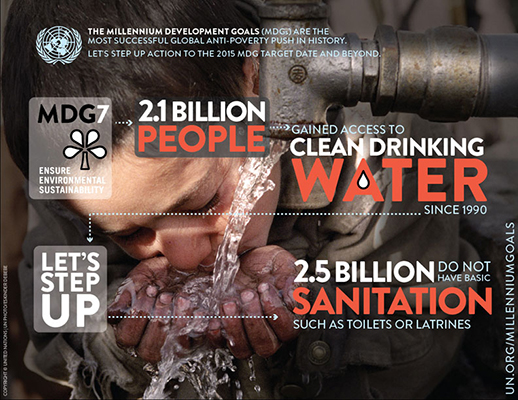Goal 7: Ensure environmental sustainability
At first glance, environmental sustainability can seem slightly detached from the overall MDG aim of tackling worldwide poverty. However, building a sustainable environment for human beings around the world can in fact be a key way to improving global living standards.
This seventh Millennium Development Goal is far-reaching, and aims to engage with a range of issues, from providing access to clean drinking water in underdeveloped areas, to reversing the effects of deforestation. Issues such as the latter, which may be thought of as purely environmental problems, in fact have a huge impact on some of the world’s poorest citizens, who depend on these natural resources for water, food and fuel. Similarly, Goal 7 also aims to promote marine conservation, recognising that the destruction of marine biodiversity gravely affects the functioning of ecosystems on which we all depend.
Here are the specific targets that have been laid down by the UN and its partner organisations in order to achieve MDG7:
1. Integrate the principles of sustainable development into country policies and programmes and reverse the loss of environmental resources
2. Reduce biodiversity loss, achieving, by 2010, a significant reduction in the rate of loss
3. Halve, by 2015, the proportion of the population without sustainable access to safe drinking water and basic sanitation
4. Achieve, by 2020, a significant improvement in the lives of at least 100 million slum dwellers
The undeniable link between human survival and the health of the environment in which we live, makes certain figures worrying indeed. For example, the UN estimates that carbon emissions have increased by an astounding 46% since 1990. Similarly, around 3.6 million hectares of forest were lost between 2005 and 2010 in Latin America alone. In terms of the immediate environment of some of the world’s poorest people, a UN fact sheet reports that an estimated 863 million are still living in slums in the developing world, with obvious effects on health and standards of living.
So what is being done? Given the wide focus of MDG7, the different initiatives currently being carried out around the world are highly varied. In the north east of Brazil, for example, where harsh environmental conditions often lead locals to damage local forests through illegal charcoal production, the International Fund for Agricultural Development is helping to promote agro-ecology. Elsewhere, in a bid to improve the sanitation conditions of people living in some of the world’s poorest areas, the UN member states adopted the “Sanitation for all” resolution in July 2013. In a multilateral partnership between member states, civil society and other development organisations, this initiative hopes to radically increase access to safe drinking water and basic sanitation in the parts of the world that need it most.
So what can you do? Lattitude offers a range of sustainable environmental volunteering projects around the world, from Ecuador to Japan. You can also help achieve the UN’s Millenium Development Goals by taking part in Lattitude’s ICS programme, in partnership with the government’s Department for International Development. If you would like to find out more about the volunteering opportunities available to you, get in touch at [email protected].


